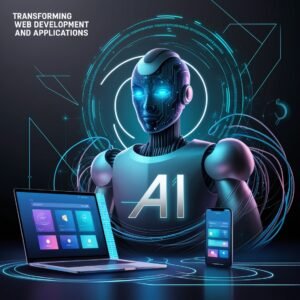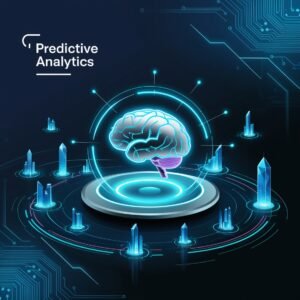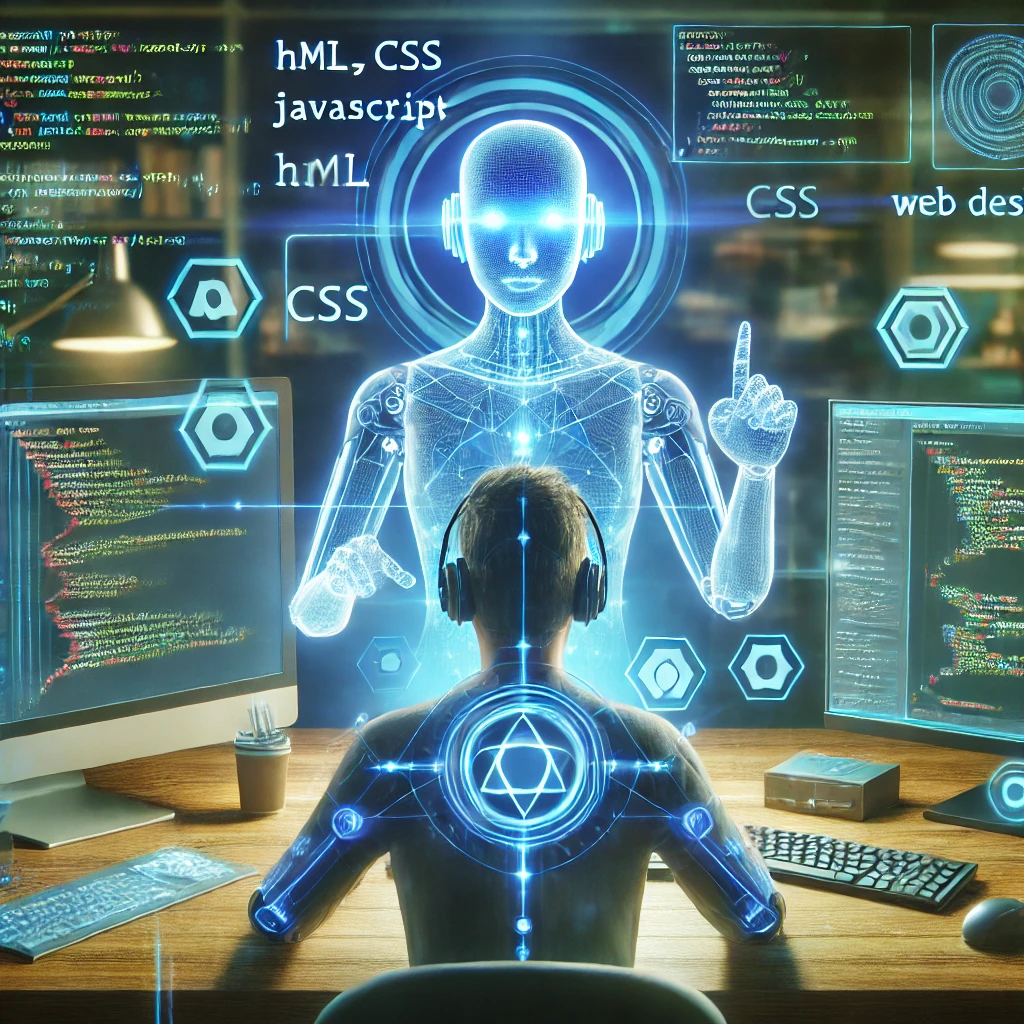
Are You wondering how AI is Transforming Web Development? lookno further read our blog carefully. Artificial intelligence (AI) is shaking things up in web development and applications. As technology speeds ahead, developers and businesses are turning to AI to make web experiences smoother, smarter, and more tailored than ever. Imagine websites that practically anticipate what users want, streamlined workflows that make developers’ lives easier, and personalized touches that keep users coming back. In this article, we’ll dive into the incredible ways AI is reshaping web development, from automated code generation to predictive analytics and smarter SEO practices. Ready to stay ahead of the game with these AI-powered tools? Let’s explore!
1. AI-Powered Code Generation: Enhancing Efficiency in Web Development
One of the major applications of AI in web development is automated code generation. By using advanced AI-powered tools like GitHub Copilot and OpenAI Codex, developers can speed up coding tasks. These tools offer code suggestions, complete syntax, and even generate entire components based on user requirements. For web developers in 2025, AI-driven code generation is essential, enabling faster delivery of high-quality code and reducing repetitive tasks.
Automating code generation not only saves time but also minimizes errors, enhancing the overall quality of web applications. AI also assists in debugging by identifying patterns in previous issues, ensuring developers write clean and efficient code, which ultimately improves user experience and performance.
2. AI is Transforming Web Development
AI for personalization is crucial in 2025, as users expect customized experiences. With AI, web applications analyze user behavior, preferences, and demographics, enabling highly tailored interactions. Personalization algorithms recommend content, products, and search results that align with each user’s unique interests.
For instance, e-commerce websites utilize AI-powered recommendation engines to suggest products based on previous purchases and browsing habits. This increases conversion rates and keeps users engaged. AI-driven personalization enhances the overall user experience, making it an indispensable tool for modern web development.
3. Natural Language Processing (NLP): Enhancing Chatbots and Voice Search

AI-driven Natural Language Processing (NLP) technology is improving customer service and engagement through advanced chatbots and voice interfaces. By interpreting human language, NLP enables chatbots to offer accurate responses and solve user queries in real time, ensuring users have a seamless interaction on websites.
Though, Voice search is becoming increasingly popular, and AI-powered voice interfaces enable users to interact without typing. This is particularly useful for mobile applications, and voice-enabled chatbots ensure inclusivity for users with disabilities. In 2025, AI-driven NLP technology is elevating the user experience and making web applications more accessible.
you can also read
AI Development: How AI is Revolutionizing Business Processes in 2024
4. Artificial Intelligence in Automated Testing and Quality Assurance for Web Applications
AI is revolutionizing automated testing and quality assurance (QA), making it easier to identify bugs and optimize web applications across devices. AI testing tools like Selenium, Testim, and Applitools simulate user interactions, test complex scenarios, and automatically flag issues, reducing the time and effort required for quality assurance.
Automated testing enhances security and reliability, ensuring that web applications meet high standards. By integrating AI-driven testing tools, developers can launch applications faster and with fewer errors, delivering a consistent user experience across platforms.
5. Improving Web Security with AI
In 2025, AI for web security is crucial as cyber threats evolve. AI-driven algorithms monitor website traffic, analyze user behavior, and detect anomalies that indicate potential security threats. AI-powered security tools, like Darktrace and Vectra, autonomously respond to security risks, reducing the chance of data breaches and unauthorized access.
For web developers and businesses, AI security measures offer peace of mind by enhancing data protection. Using AI-driven web security tools, websites remain secure, user data is protected, and compliance with industry standards is maintained.
6. Content Generation and AI-Powered CMS Solutions
AI-driven content generation tools are simplifying content management for websites and applications. Tools like ChatGPT and Jasper automate the generation of SEO-friendly text, headlines, and even images, keeping websites updated with minimal human input. This is particularly useful for websites that require fresh content to maintain user engagement.
Furthermore, With AI in content management systems (CMS), developers and marketers can automate content production, saving time and ensuring websites are consistently engaging and optimized for search engines. AI-powered CMS platforms also provide analytics on engagement trends, allowing businesses to refine content strategies based on real-time insights.
7. AI-Enhanced SEO and Analytics

SEO remians critical in 2025, and AI-powered SEO tools are providing smarter solutions for web developers. AI tools like Clearscope and MarketMuse suggest keywords, analyze search trends, and optimize content structures to meet search engine requirements. Additionally, machine learning algorithms in Google Analytics and Adobe Analytics analyze user data, revealing insights into behavior and engagement.
With AI, developers can boost SEO rankings, drive organic traffic, and improve conversion rates. These tools adapt to changing algorithms and provide the best SEO practices, ensuring that websites achieve higher visibility and remain competitive in search engine results.
8. AI-Powered Design Assistance and Aesthetics Optimization
Creating visually appealing websites is easier with openAI design tools like Adobe Sensei and Figma’s AI features. These tools assist developers by suggesting colors, layouts, and typography, streamlining the design process. AI design tools also offer data-driven insights into user behavior, which can help optimize page elements for a better user experience.
In 2025, AI-driven design is a game-changer, allowing developers to create aesthetically pleasing and responsive web applications that captivate users. By enhancing design decisions based on user interaction patterns, websites are not only beautiful but also effective at engaging users.
9. Predictive Analytics for Anticipating User Needs
AI-powered predictive analytics is a vital tool for AI is Transforming Web Development in web development for understanding user behavior. By analyzing user data, predictive analytics can anticipate user actions, suggest relevant content, and offer a more intuitive browsing experience. For example, e-commerce websites use predictive analytics to re-engage users who abandon their shopping carts by

reminders or tailored offers.
Predictive analytics helps businesses improve customer satisfaction, drive engagement, and increase conversions. AI in predictive analytics is empowering developers and businesses to create proactive and user-centered applications that keep users engaged.
10. AI is Transforming Web Development
Looking ahead, AI is expected to further impact Augmented Reality (AR) and Virtual Reality (VR) applications in web development. AI enhances AR/VR experiences by analyzing and adapting to user interactions, making them more immersive. In industries like e-commerce, real estate, and education, AI-driven AR/VR is offering users interactive experiences that are more realistic and engaging than ever before.
Moreover, By adopting AI in AR/VR, developers can offer novel experiences that engage users at a deeper level, making websites and applications future-ready for an immersive digital era.
Conclusion:
In 2025, artificial intelligence for web development is no longer a luxury; it’s a necessity. AI-powered tools for code generation, personalized user experiences, automated testing, security, and SEO are enabling developers to create smarter and more responsive websites. The future of web development lies in embracing AI-driven solutions that enhance productivity, improve user satisfaction, and increase business efficiency.
As AI technology continues to evolve, its applications in web development will become more sophisticated, enabling developers to build dynamic, engaging, and user-centered websites that stand out in a competitive digital world. By staying updated with AI is Transforming Web Development, businesses can leverage these advancements to deliver value to their users, enhance brand loyalty, and achieve long-term growth.

